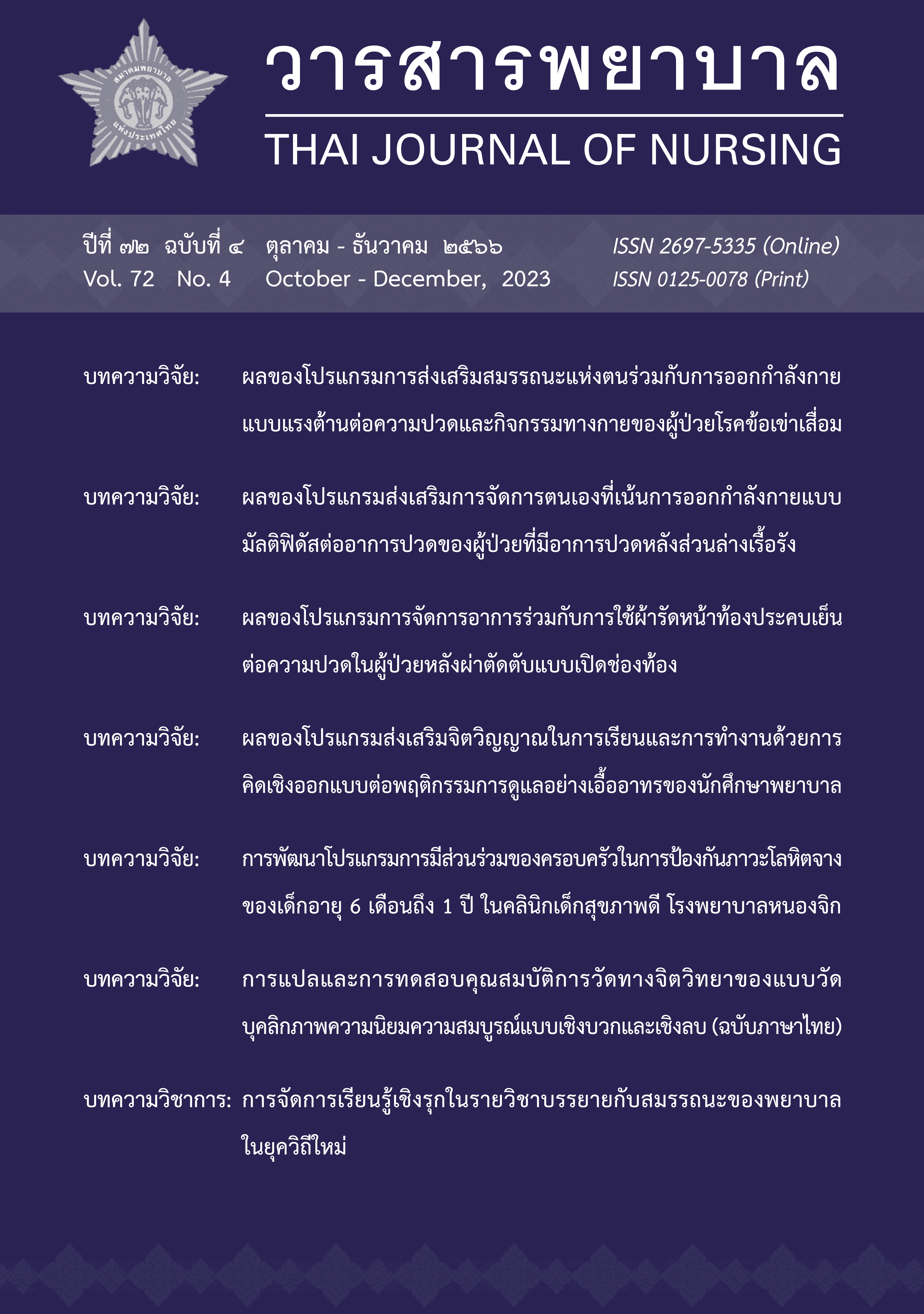Translation and psychometric properties testing of the positive and negative perfectionism scale (Thai version)
Main Article Content
Abstract
The purposes of this research were to translate and to examine psychometric properties of the positive and negative perfectionism scale (Thai version [PNPS-Thai version] ). The research process consisted of two phases: Phase 1: Translation and determination of the cultural content validity of the PNPS-Thai version using a process of forward and reverse translation that was applied in conjunction with translation and cultural adjustment processes. Phase 2: Determination of the reliability of the PNPS-Thai version. The research results showed that the content validity index for cultural content of the PNPS-Thai version was 1.00 and the Cronbach's alpha coefficient of the total scale was 0.943. The Cronbach's alpha coefficient of the positive perfectionism scale was 0.925, and the negative perfectionism scale was 0.914.
Article Details

This work is licensed under a Creative Commons Attribution-NonCommercial-NoDerivatives 4.0 International License.
References
จิดาภา ดวงทิพย์. (2562). ปัจจัยพยากรณ์ความผาสุกทางจิตใจของพยาบาลวิชาชีพ โรงพยาบาลเอกชนในจังหวัดเชียงใหม่ [วิทยานิพนธ์ปริญญามหาบัณฑิต ไม่ได้ตีพิมพ์]. มหาวิทยาลัยเชียงใหม่.
นันทกา สวัสดิพานิช และสุจิตรา เทียนสวัสดิ์. (2554). การแปลเครื่องมือเพื่อใช้ในงานวิจัยข้ามวัฒนธรรม: เทคนิคและประเด็นที่ต้องพิจารณา. วารสารสภาการพยาบาล, 26(1), 19-28.
Akour, M., & AL-Omari, H. (2013). Empirical investigation of the stability of IRT item-parameters estimation. International Online Journal of Educational Sciences, 5(2), 291-301.
Asgari, A., & Kramer, J. M. (2008). Construct validity and factor structure of Persian occupational self-assessment. Occupational Therapy in Health Care, 22(1), 2-3.
Beaton, D. E., Bombardier, C., Guillemin, F., & Ferraz, M. B. (2000). Guidelines for the process of cross-cultural adaptation of self-report measures. Spine, 25(24), 3186-3191.
Besharat, M. A. (2005). Evaluating psychometric properties of Farsi version of the positive and negative perfectionism scale. Psychological Reports, 97(1), 33-42.
Besharat, M. A. (2009). Reliability and factor validity of a Farsi version of the positive and negative perfectionism scale. Psychological Reports, 105(1), 99-110.
Brislin, R. W. (1970). Back-translation for cross-cultural research. Journal of Cross-cultural Psychology, 1(3), 185-216.
Egan, S., Piek, J., Dyck, M., & Kane, R. (2011). The reliability and validity of the positive and negative perfectionism scale. Clinical Psychologist, 15(3), 121-132.
Egan, S., Piek, J., Dyck, M., & Kane, R. (2011). The reliability and validity of the positive and negative perfectionism scale. Clinical Psychologist, 15(3), 121–132. https://doi.org/10.1111/j.1742-9552.2011.00029.x
Haase, A. M., Prapavessis, H., & Owens, R. G. (2002). Perfectionism, social physique anxiety and disordered eating: A comparison of male and female elite athletes. Psychology of Sport and Exercise, 3(3), 209-222.
Kundi, Y. M., Hollet-Haudebert, S., & Peterson, J. (2022). Career adaptability, job crafting and subjective career success: the moderating roles of lone wolf personality and positive perfectionism. Personnel Review, 51(3), 945-965. doi:10.1108/PR-04-2020-0260
Lord, F. M., & Novick, M. R. (1968). Statistical theories of mental test scores. Addison-Wesley.
Melrose, S. (2011). Perfectionism and depression: Vulnerabilities nurses need to understand. Nursing Research and Practice, 2011, Article 858497. https://doi.org/10.1155/2011/858497
Ocampo, A. C. G., Wang, L., Kiazad, K., Restubog, S. L. D., & Ashkanasy, N. M. (2020). The relentless pursuit of perfectionism: A review of perfectionism in the workplace and an agenda for future research. Journal of Organizational Behavior, 41(2), 144-168. https://doi.org/10.1002/job.2400
Rovinelli, R. J., & Hambleton, R. K. (1976). On the use of content specialists in the assessment of criterion-referenced test item validity. Dutch Journal for Educational Research, 2, 49–60.
Şahin, A., & Anıl, D. (2017). The effects of test length and sample size on item parameters in item response theory. Educational Sciences: Theory & Practice, 17(1),321-335.
Terry-Short, L. A., Owens, R. G., Slade, P. D., & Dewey, M. E. (1995). Positive and negative perfectionism. Personality and Individual Differences, 18(5), 663-668.
https://doi.org/10.1016/0191-8869(94)00192-UGet rights and content
Yusoff, M. S. B. (2019). ABC of content validation and content validity index calculation. Education in Medicine Journal, 11(2), 49-54.
Zhou, X., Wu, S., Zhu, H., & Cai, T. (2016). Reliability and validity of the positive and negative perfectionism scale among Chinese college students. Social Behavior and Personality an International Journal, 44(5), 727-736.


